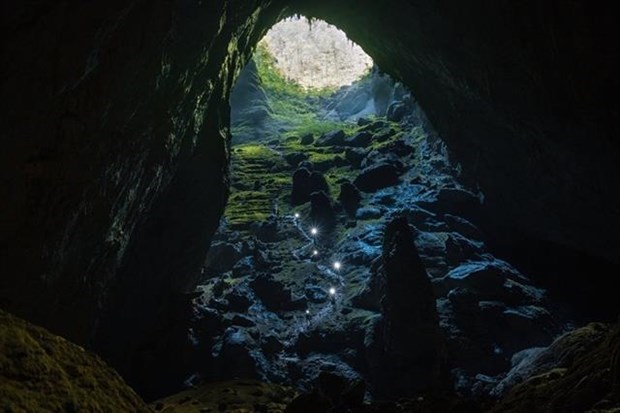Son Doong cave among best virtual tours of world's natural wonders
Son Doong Cave in the central province of Quang Binh has been named among 10 of the best virtual tours of the world's natural wonders by British newspaper The Guardian.
Part of the Son Doong Cave (Photo: bvhttdl.gov.vn)
Son Doong Cave in the central province of Quang Binh has been named among 10 of the best virtual tours of the world's natural wonders by British newspaper The Guardian.
Via a National Geographic project titled “Son Doong 360” aiming to preserve the cave in digital form, wanderlusts are able to explore the world’s largest natural cave with their computers or smartphones.
A trek, created from 360-degree images and atmospheric sound effects, heads through light-filled caverns, passing a 70 metre-tall stalagmite, and huge sinkhole jungles.
Viewers are advised to “take advantage of the high definition images to zoom into details of the cave’s geology, flora and fauna”, said the newspaper.
Son Doong Cave, said to be the world's largest, is located in the heart of the Phong Nha-Ke Bang National Park, a UNESCO World Heritage Site in Quang Binh.
It was named on the list of the seven new wonders of the world for 2020 by prestigious travel magazine Conde Nast Traveler.
The cave, which has a large, fast-flowing underground river inside, was discovered by local resident Ho Khanh in 1991.
Khanh’s discovery made world news in April 2009 after a group of British scientists from the British Cave Research Association, led by Howard and Deb Limbert, conducted a geographical survey of Phong Nha-Ke Bang.
Son Doong Cave has since drawn international attention and become a staple on adventure bucket lists for travellers from around the world./.
VNA
 Community tourism transforms livelihoods in remote areas
Community tourism transforms livelihoods in remote areas
 Agoda lists Da Lat among cheapest destinations for year-end holidays
Agoda lists Da Lat among cheapest destinations for year-end holidays
 TasteAtlas picks out two Vietnamese dishes among world’s 100 best rated crustacean dishes
TasteAtlas picks out two Vietnamese dishes among world’s 100 best rated crustacean dishes
 Vietravel expands business in Indian market
Vietravel expands business in Indian market
 2025 Nha Trang – Khanh Hoa Sea Festival to spotlight cultural heritage space
2025 Nha Trang – Khanh Hoa Sea Festival to spotlight cultural heritage space
Vietnam, a unique destination attracting Indian tourists: Indian newspaper
 Cao Bang eyes new opportunities for cross-border tourism development
Cao Bang eyes new opportunities for cross-border tourism development
 Kien Giang strives to attract tourists to finish the year on high note
Kien Giang strives to attract tourists to finish the year on high note
 Rivers provide major resources to boost Vietnam’s tourism
Rivers provide major resources to boost Vietnam’s tourism
 Dong Thap plants over 100 ha of flowers for Tet
Dong Thap plants over 100 ha of flowers for Tet




